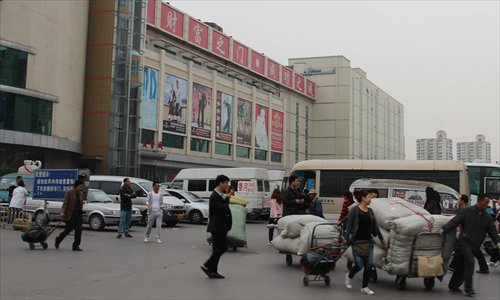HOME >> CHINA
Most market vendors reluctant to leave Beijing
Source:Xinhua Published: 2015-10-26 19:13:01

Vendors carrying packaged goods walk outside the Dahongmen wholesale market in Beijing in 2014. Photo: IC
Like thousands of merchants in Dahongmen, one of the major wholesale markets in Beijing, 45-year-old Shi Ankai has a tough decision to make: where to go next.
Shi's clothing wholesale chain needs to be relocated, according to an integration plan for Beijing and neighboring Hebei Province and Tianjin Municipality.
Shi has rented a shop in the Baigou area of Baoding, Hebei Province, about a two-hour drive from Beijing, but he is not sure whether he will move all his business there.
"I have spent the last few months visiting different sites in different cities, which are offering different incentives, but none of them seem charming enough," he said.
Shi's indecision is shared by many wholesalers facing relocation. Beijing ordered wholesale markets to move to neighboring cities last year as part of an integration plan aimed at easing congestion and addressing other urban ills. Since then, competition has flared among neighboring cities including Shijiazhuang, Langfang, Baoding and Tianjin, each dangling its own incentives to lure businesses. However, the road out of Beijing has been bumpy for many.
Slow progress
Over the last two decades, Dahongmen, located near the South Fourth Ring Road in Fengtai district, developed into a large market with vendors mostly selling clothing and household items.
Before relocation kicked off last year, Dahongmen had 25,000 shops in 45 smaller markets or sections, which traded in clothing, fur, hats, shoes, construction materials and textiles, among other items.
Under the integration plan, most of the markets will be relocated and renovated.
Lu Dawen, director of the market's relocation office, said only 10 sections will stay, and they will be focused on retailers and branded shops.
Since last year, nine small markets with lower trade volume have been closed, affecting 12,880 workers and vendors. Last month, two shoe markets were shut down.
Lu said the relocation will be finished by 2018. With the deadline approaching, tenants say the lack of a timetable and step-by-step procedures has troubled many.
"I still haven't decided yet. I'll look around and see where things are heading," said Shi.
Jin Guijie, 50, is still busy overseeing his garment sales at the Dongpi market, the Chinese abbreviation for the Beijing Zoo Wholesale Market in downtown area.
Though business is still bustling for now, he worries about the future. "My contract with the market expires next February. Although we have not received notice about moving, we are worried it may come eventually," he said.
"What if I put my money in Hebei and no customers come? The old market is already struggling under the economy, let alone new ones," he said.
What Beijing has and they don't
Few doubt the purchasing power of the Chinese capital's population. Beijing's average disposable income per person was 43,910 yuan ($6,960) in 2014, while Hebei's was 24,220 yuan.
The easy and direct access to the market, convenient transportation, favorable support facilities and infrastructure give the capital a lasting allure for vendors.
Nearby cities, which are vying for their business, have offered incentives including free rent, tax cuts and favorable education policies. But unless tenants are guaranteed success many business owners are cautious about making a decision.
According to a poll of 10,000 vendors at Dahongmen, 65 percent said they do not want to leave Beijing. About 30 percent replied that they are willing to try business elsewhere, but do not find Hebei to be an ideal location. The rest said they would rather go back to their hometowns, many of which are far from Beijing.
"Few tenants have moved all of their business here. Their inventories are quite low, driving away the few wholesale buyers that did come here," said Zheng Gang, a senior manager of the Baigou market.
Business at the new Dongpi market in Langfang is also bleak. Daily customer flow is only 4,000, compared to 50,000 at the old Dongpi in Beijing.
A welcome change
Wang Baisong was among the first group to leave Beijing. Last year, the 35-year-old moved his shops and warehouses from Dahongmen to Baigou.
"My shop in Beijing was 12 squaremeters, and the rent, the warehouse, the tons of fees and costs piled up to 500,000 yuan a year. The pressure is overwhelming," he said.
Now he runs a much larger shop at 10 percent of the cost. "Relocation brings me a better quality of life. For others, I'm not sure. They need to get something from relocation," he said.
"I hope the infrastructure and other support services can be improved, and more tenants will come and bring more customers," he said.
Newspaper headline: Closing time
Posted in: Society